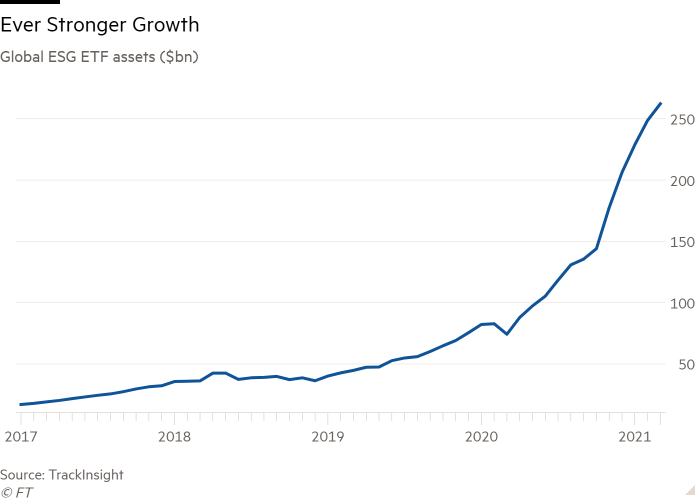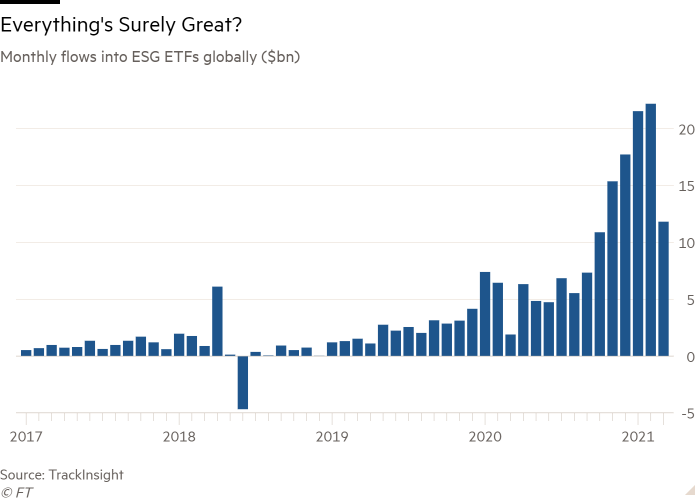[ad_1]
Interested in ETFs?
Visit our ETF Hub for investor news and education, market updates and analysis and easy-to-use tools to help you select the right ETFs.
The widely held belief that “sustainable†investing delivers outperformance is a mirage and the above-market returns are actually achieved by exposure to so-called style factors long known to boost investment returns, academic research shows.
Numerous studies have purported to show that environmental, social and governance-based investment has tended to deliver outperformance in recent years, particularly during the pandemic-driven sell off of March-April 2020.
A recent NYU paper found that the majority of more than 200 studies published since 2015 concluded that ESGÂ boosted returns. These studies have helped open the floodgates to ESG investing, with self-proclaimed ESG funds attracting $340bn of inflows over the past two years, according to EPFR.
However, fresh analysis by Scientific Beta, a “smart beta†index provider linked to the Edhec Research Institute, a French academic think-tank, disputes the claims that ESG funds have tended to outperform the wider market, or, in industry jargon, generate “alphaâ€.Â
“There is no ESG alpha,†said Felix Goltz, research director at Scientific Beta and co-author of the as yet unpublished paper, “Honey, I Shrunk the ESG Alphaâ€.
“The claims of positive alpha in popular industry publications are not valid because the analysis underlying these claims is flawed,†with analytical errors “enabling the documenting of outperformance where in reality there is noneâ€, he added.
Scientific Beta analysed 24 ESG strategies that have been shown to outperform in other academic papers. It did find evidence that ESG funds have tended to outperform, with ESG leaders typically beating ESG laggards by almost 3 percentage points a year.
However, in both the US and other developed markets, it found that three-quarters of the outperformance is due to “quality†metrics, such as high profitability and conservative investment.
Quality has long been recognised as one of the investment “factors†that have traditionally tended to drive above-market returns.
“Despite relying on analysis of non-financial information by hundreds of ESG analysts, ESG strategies perform like simple quality strategies mechanically constructed from accounting ratios,†the paper said.
“Of the 24 strategies, not one has significantly outperformed when you adjust for this factor and that to me is quite striking,†said Goltz. “It’s just the case that over the last decade quality has outperformed and if you use ESG scores that inherently tilts [a portfolio] to quality.
“You can ask the question; what is the value of the ESG analysis?†Goltz added, if ESG portfolios can be constructed simply by analysing high-level balance sheet data.

The paper argued that ESG strategies “do not offer significant downside risk protectionâ€.
It also found that the outperformance of ESG strategies had essentially only occurred since 2013, when interest in ESG investing started to “rise remarkablyâ€, suggesting returns have been artificially inflated by momentum pushing up the value of ESG-friendly stocks.
“We are getting a biased view of ESG performance, unless you assume that attention permanently rises,†Goltz said.
“If attention stops rising we would expect that performance will go back to its long-term average [ie in line with the market]. But it’s worse than that — valuations have gone up so the long-term expected returns will be lower than they were before,†he added.
Climate Capital

Where climate change meets business, markets and politics. Explore the FT’s coverage hereÂ
Not everyone would agree with Scientific Beta’s conclusions. One large asset manager said “we don’t agree with the findings of the paper. This is based on our own research as well as white papers from many other organisationsâ€.
However Vitali Kalesnik, director of research in Europe at Research Affiliates, a pioneer in smart beta, said Scientific Beta’s conclusion was “quite consistent with much of what we have written. The overlap between ESG, especially measures related to the ‘G’ [or governance], and quality is pretty large.â€
Sony Kapoor, managing director of the Nordic Institute for Finance, Technology and Sustainability, a think-tank, was more outspoken, saying: the paper “puts in black and white what is only whispered in the corridors of finance — most ESG investing is a ruse to launder reputations, maximise fees and assuage guilt.Â

“Between the countless ways of measuring and weighing ESG scores, the ad hoc nature of ‘ESG integration’ and the reality of ESG performance reflecting sectoral tilts and quality factors rather than environmental, social or governance drivers, the entire field of ESG investing is built on shaky foundations that crumble under closer scrutiny.â€
Kalesnik argued that ESG investing still had a place if investors were primarily focused on changing the world by reallocating capital towards “better†companies and engaging with other firms to encourage them to change their ways.
If people “want to invest [in ESG] purely because it will drive performance then I think it is bad news. If they want to outperform they should target factors that achieve that goal. If they are open to non-financial reasons then they should go ahead,†he said.
Goltz agreed, saying “investors who look for value-added through outperformance are looking in the wrong place [but] it might be time to consider ESG strategies for the unique benefits that they can provide, such as hedging climate or litigation risk, aligning investments with norms and making a positive impact for society.â€
Kapoor was unconvinced, though, saying: “those who continue to tout ESG investing, as currently practised, even after reading this paper, can be only one of three things — knaves, fools, or ESG professionals who know which side their bread is buttered on.Â
“Most asset managers know the paper’s central premise, that ESG outperformance disappears when adjusted for risk, sector bias and quality factors, to be true, yet continue to present data in a way that deliberately ignores this to ride the wave of investor interest,†he added.
“Most ESG investing is little more than a marketing trick. The message is not ‘ignore ESG’ but rather ‘do not buy the narrative of ESG outperformance’.â€

Click here to visit the ETF Hub
[ad_2]
Source link





